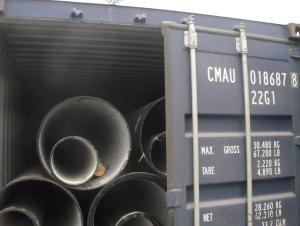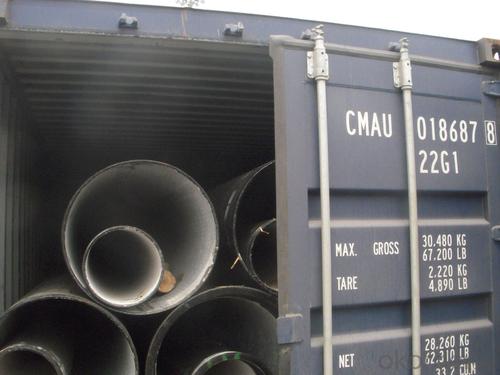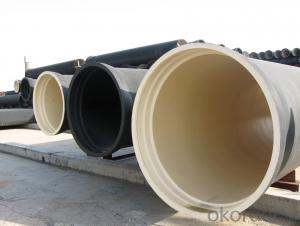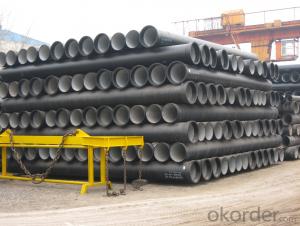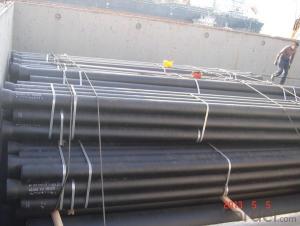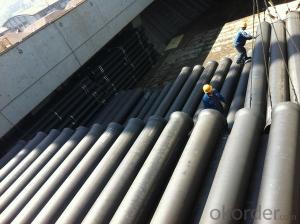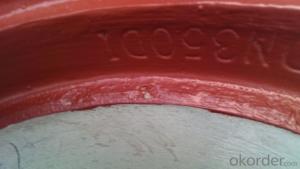T Type Ductile Iron Pipe DN200 C40 CLASS SOCKET SPIGOT PIPE
- Loading Port:
- Tianjin
- Payment Terms:
- TT OR LC
- Min Order Qty:
- 25 m.t
- Supply Capability:
- 30000 m.t/month
OKorder Service Pledge
OKorder Financial Service
You Might Also Like
1) The standard of pipe: ISO2531:1998, EN545:2006,K9 K8
2) Effective length: 6m/5.7m
3) Inner cement line: Portland cement lineas per ISO4179
4) Zinc coating: at least 130g/m2 as per ISO8179
5) Bitumen painting: at least 70μm as per ISO8179
6)With 102% quantity of NBR, SBR, or EPDM ring asper ISO4633
7) DN80-DN1200
8) Highstrength, lighter than grey iron, good corrosion resistance, no furring, smallflow resistance, easy fixing, long life tome about 100 yeas
9)Checked by automatic inspection equipment
10) Composition:
Chemical composition | |||
Chemical composition | Ductile Cast Iron Pipe (%) | Grey iron pipe (%) | Steel pipe (%) |
C | 3.5-4.0 | 3.2-3.8 | 0.1-0.2 |
Si | 1.9-2.6 | 1.4-2.2 | 0.15-0.4 |
Mn | 0.15-0.45 | 0.4-0.6 | 0.3-0.6 |
P | ≤0.06 | ≤0.3 | 0.02-0.03 |
S | ≤0.02 | ≤0.1 | 0.02-0.03 |
Mg | 0.03-0.06 |
|
|
11) Feature:
Mechanical properties | |||
| Ductile Cast Iron Pipe | Grey Iron Pipe | Steel Pipe |
Tensile Strength(Mpa) | ≥420 | 150-260 | ≥400 |
Yield Strength(Mpa) | ≥300 | No Confirmation | No Confirmation |
Bending Strength(Mpa) | ≥590 | 200-360 | ≥400 |
Elongation (%) | ≥10 | Neglected | ≥18 |
Brinell Hardness(HBS) | ≤230 | ≤230 | About 140 |
12) T type mechanical joint
13) Packing: in bulk or container
PACKING: 1) Pipesare bundled together with the steel belt.
2) Wooden pieces are put between the pipes.
- Q: Are ductile iron pipes suitable for horizontal directional drilling (HDD) installations?
- Yes, ductile iron pipes are suitable for horizontal directional drilling (HDD) installations. Ductile iron pipes are known for their strength and durability, making them an excellent choice for HDD projects. HDD involves drilling a horizontal hole underground and pulling a pipe through it, which can be challenging due to the forces exerted on the pipe during installation. Ductile iron pipes can withstand these forces and maintain their structural integrity, ensuring a successful HDD installation. Additionally, ductile iron pipes have excellent corrosion resistance, making them suitable for various soil and environmental conditions encountered during HDD projects. Overall, ductile iron pipes offer the necessary characteristics to withstand the rigors of HDD installations and are a reliable choice for such applications.
- Q: Can ductile iron pipes be used for agricultural applications?
- Certainly, agricultural applications can make use of ductile iron pipes. Ductile iron, being a robust and long-lasting material, possesses a corrosion-resistant property that renders it appropriate for diverse agricultural purposes. These pipes are applicable for irrigation systems, drainage systems, water supply systems, and other agricultural infrastructure projects. With their exceptional tensile strength, ductile iron pipes can endure the external pressures and stress that agricultural environments may impose. Furthermore, their prolonged lifespan lessens the necessity for frequent replacements, and they are capable of accommodating high water flow rates. Consequently, ductile iron pipes emerge as a dependable choice for agricultural applications.
- Q: Are ductile iron pipes more resistant to breaks and cracks than other pipe materials?
- Yes, ductile iron pipes are generally more resistant to breaks and cracks compared to other pipe materials. Ductile iron is a type of cast iron that has been treated with magnesium to make it more flexible and less brittle. This enhanced flexibility allows ductile iron pipes to withstand high levels of pressure and external loads without breaking or cracking. Compared to other common pipe materials like PVC, HDPE, or steel, ductile iron pipes have superior strength and durability. They have a higher tensile strength, which means they can withstand greater forces and pressures without failing. Additionally, ductile iron pipes have a higher impact resistance, making them less prone to cracking or breaking under sudden impact or external loads. Another advantage of ductile iron pipes is their resistance to corrosion. The material is naturally resistant to rust and can withstand harsh environmental conditions, making it suitable for underground installations or areas with corrosive soils. This corrosion resistance further contributes to the longevity and overall integrity of the pipes. Furthermore, ductile iron pipes have a longer lifespan compared to other pipe materials. They are designed to last for several decades, often exceeding 50 years, with minimal maintenance. This extended lifespan reduces the need for frequent replacements, saving both time and money in the long run. However, it is important to note that no material is completely immune to damage or failure. Proper installation, maintenance, and adherence to industry standards and guidelines are essential to ensure the optimal performance and longevity of ductile iron pipes. Regular inspection and monitoring should also be conducted to identify any potential issues or signs of deterioration, allowing for timely repairs or replacements.
- Q: Can the underground cast iron pipes be connected with clamps to form buttress?
- The hoop has the advantages of beautiful appearance, convenient operation, strong clamping force, good sealing performance, etc.. Mainly used for connecting and fastening vehicle, ship, diesel engine, gasoline engine, machine tools, fire, and other machinery and equipment, chemical equipment general nylon hose, plastic hose, hose cloth, water interface and seal etc..
- Q: Are ductile iron pipes suitable for underground applications?
- Yes, ductile iron pipes are suitable for underground applications. Ductile iron pipes are known for their durability, strength, and corrosion resistance, making them an ideal choice for underground installations. These pipes can withstand heavy loads, ground movement, and external pressure, making them suitable for burying underground. Additionally, ductile iron pipes have a long lifespan, often lasting more than 100 years, which is crucial for underground applications where accessibility and maintenance can be challenging. Overall, their robustness and longevity make ductile iron pipes a reliable and suitable choice for underground applications.
- Q: How does ductile iron pipe perform in areas with high water hammer?
- Areas with high water hammer are well-suited for the use of ductile iron pipe, as it exhibits exceptional performance in these conditions. The robustness and durability of ductile iron enable it to withstand the forceful impact of water hammer without experiencing significant damage. Water hammer is characterized by a sudden surge in pressure resulting from the rapid alteration of water flow direction or velocity, often occurring when valves are swiftly closed. This abrupt pressure change places substantial stress on pipes, potentially leading to ruptures or failures. Nevertheless, ductile iron pipes possess outstanding resistance to such impact due to their unique composition and manufacturing processes. These pipes are comprised of a blend of iron, carbon, and small quantities of other elements like silicon and magnesium. The formation of graphite nodules during manufacturing grants ductile iron its exceptional strength and flexibility, rendering it less prone to cracking or breaking under pressure. In environments where water hammer is prevalent, ductile iron pipe's inherent strength and resilience allow it to absorb and dissipate the force generated by water hammer events. Its capacity to endure sudden pressure changes aids in preventing pipe failures, thereby minimizing the risk of leaks or bursts. Furthermore, the smooth inner surface of ductile iron pipes reduces the likelihood of water hammer incidents by minimizing turbulence and maintaining a steady flow. This particular attribute assists in mitigating the impact of water hammer on the pipe system. Overall, ductile iron pipe emerges as an ideal choice for areas prone to high water hammer due to its exceptional strength, impact resistance, and ability to withstand abrupt pressure changes. Its performance under such conditions ensures the longevity and dependability of water distribution systems.
- Q: How does ductile iron pipe perform in sandy or unstable soils?
- Due to its inherent strength and flexibility, ductile iron pipe exhibits exceptional performance in sandy or unstable soils. Its composition, which includes a combination of iron, carbon, and small amounts of other elements, grants it superior mechanical properties compared to other pipe types. In sandy soils, where the ground may shift and cause pipe movement and deformation, ductile iron's high tensile strength and elongation characteristics enable it to withstand pressure and stress without fracturing or breaking. Its flexibility allows it to accommodate soil movement and settlement, reducing the risk of pipe failure. Furthermore, ductile iron pipe's resistance to corrosion makes it highly suitable for installation in sandy soils. The application of protective linings and coatings on both the interior and exterior of the pipe prevents corrosive elements in the soil from attacking the iron, ensuring durability and reliability in the long term. In unstable soils with varying compaction levels or weak load-bearing capacity, ductile iron pipe's sturdy construction provides stability and support. Its robustness allows for even distribution of loads, minimizing the chances of pipe deflection or collapse. Moreover, the joint design and sealing methods of ductile iron pipe, such as push-on joints or mechanical joints with rubber gaskets, offer excellent leak resistance and prevent soil infiltration. This further enhances its performance in sandy or unstable soils. Overall, the combination of strength, flexibility, corrosion resistance, and reliable joint systems makes ductile iron pipe an ideal choice for applications in sandy or unstable soils. It provides a long-lasting and efficient solution for the transmission of water and wastewater.
- Q: How can the three pipes of ductile iron leak?
- When the pipe connection of the three water leakage, first of all to see whether it is to do the pipe three links of the manufacturers, pressure did not reach, if it is. It is only the replacement, if not, with cast iron electrode welding, or socket connection half!
- Q: Can ductile iron pipes be used for gas distribution systems?
- Yes, ductile iron pipes can be used for gas distribution systems. Ductile iron pipes have been widely used in various infrastructure applications, including gas distribution systems, due to their strength, durability, and corrosion resistance. These pipes are designed to withstand high-pressure gas flow and are suitable for both underground and above-ground installations. Additionally, ductile iron pipes have excellent resistance to external loads and are less prone to damage or breakage, making them a reliable and safe choice for gas distribution systems. However, it is important to ensure that the pipes are properly coated and protected against any potential corrosive elements present in the gas or soil to maintain their longevity and performance.
- Q: Can ductile iron pipes be used for stormwater management?
- Certainly, stormwater management can make use of ductile iron pipes. Ductile iron, being a robust and enduring material, possesses resistance against corrosion and can endure the high rates of flow and pressure typically linked with stormwater management systems. These pipes have found extensive application across various fields, including stormwater drainage and sewage systems. Their capacity to handle substantial loads and endure environmental factors renders them an appropriate option for stormwater management, guaranteeing the smooth flow of water and averting flooding in urban regions. In addition, ductile iron pipes boast a lengthy lifespan, minimizing the necessity for frequent maintenance and replacement, thus proving to be a cost-effective selection for stormwater management infrastructure.
Send your message to us
T Type Ductile Iron Pipe DN200 C40 CLASS SOCKET SPIGOT PIPE
- Loading Port:
- Tianjin
- Payment Terms:
- TT OR LC
- Min Order Qty:
- 25 m.t
- Supply Capability:
- 30000 m.t/month
OKorder Service Pledge
OKorder Financial Service
Similar products
Hot products
Hot Searches
Related keywords
